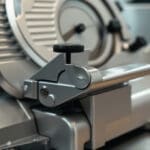Introduction
Lithium grease uses are incredibly diverse, making it one of the most popular lubricating greases worldwide. In fact, over 75% of lubricating applications across various industries utilize lithium grease. Here’s a quick snapshot of its primary uses:
- Automotive Industry: Wheel bearings, chassis lubrication, door hinges, and CV joints.
- Industrial Applications: Machinery bearings, conveyors, and manufacturing equipment.
- Household Applications: Lubricating garage doors, hinges, and latches.
Why So Popular?
Lithium grease stands out due to its multi-purpose capabilities. Its excellent heat resistance, water resistance, and adhesive properties make it an ideal choice for a wide range of applications. Users appreciate its ability to stay in place and maintain its performance under heavy loads and high temperatures, reducing the need for frequent reapplication.
Global Usage
From automotive workshops to industrial manufacturing plants, lithium grease has largely replaced traditional sodium and calcium-based greases. Its versatility and superior performance characteristics align perfectly with the demanding needs of modern machinery, ensuring efficiency and longevity.

What is Lithium Grease?
Lithium grease is a versatile lubricant that stands out due to its unique composition and impressive performance characteristics. Let’s break down its main components and see what makes it so effective.
Composition
Lithium grease is made up of three primary components:
- Base Oil (80-90%)
- Thickener (10-15%)
- Performance Additives (5-10%)
Each of these elements plays a crucial role in ensuring the grease performs optimally in various applications.
Base Oil
The base oil forms the bulk of the grease, making up 80-90% of its composition. It provides the essential lubrication properties. Without the base oil, the grease wouldn’t be able to reduce friction and wear between moving parts effectively.
Thickener
Lithium is used as the thickener in this type of grease, accounting for 10-15% of the composition. The thickener acts like a sponge, holding the base oil in place and releasing it slowly during operation. This ensures that the lubrication is long-lasting and consistent. Lithium thickeners are particularly valued for their excellent high-temperature and water-resistant properties, making them suitable for a wide range of environments.
Performance Additives
Performance additives make up the remaining 5-10% of the grease. These additives enhance the operating properties of the grease, contributing to its anti-oxidation, anti-rust, and anti-wear characteristics. For example, CRC Red Lithium Grease includes anti-oxidation, anti-rust, and anti-wear additives, making it highly versatile for automotive and industrial settings.
Why Lithium?
The choice of lithium as a thickener is no accident. Lithium soap-based greases adhere well to metal surfaces, are non-corrosive, and can withstand heavy loads. They also exhibit good temperature tolerance, with a dropping point of 190 to 220 °C (370 to 430 °F). This makes them ideal for applications where both high temperatures and water resistance are factors.
Real-World Applications
Lithium grease is widely used in various industries due to its robust properties. For instance, Beth-El Machinery Ltd. offers food packaging and processing solutions that often utilize lithium grease for its excellent performance in maintaining hygiene and efficiency. This grease is also commonly found in automotive applications such as wheel bearings, chassis, and door hinges, as well as industrial machinery and household items like garage doors and latches.
In summary, the composition of lithium grease—comprising base oil, lithium thickener, and performance additives—makes it a highly effective and versatile lubricant. Its ability to perform well under high temperatures and resist water makes it a go-to choice for many demanding applications.
Key Properties of Lithium Grease
Adhesion
One of the standout features of lithium grease is its excellent adhesion to metal surfaces. Once applied, it sticks firmly, reducing the need for frequent re-application. This strong adhesion means it stays put, saving both time and effort.
“Lithium grease demonstrates excellent adhesion to metal. This means that once it is applied, it stays there.” – Source
Non-Corrosive
Lithium grease is non-corrosive, which means it does not corrode or damage the parts it is applied to. It remains stable and does not chemically react with other substances. This makes it a reliable choice for protecting metal components from rust and corrosion.
“It is a non-corrosive grease meaning that it does not corrode the parts/machinery that it is applied to.” – Source
Heat Resistance
Lithium grease can withstand very high temperatures, making it ideal for applications that experience significant heat. It has a drip temperature of around 200°C and can be used effectively up to 120°C. This high-temperature resistance is crucial in automotive and industrial applications.
“Lithium grease demonstrates excellent heat resistance. The recommended upper limit for the use of lithium grease as a lubricant is 120° Celsius.” – Source
Water Resistance
One of the key properties that set lithium grease apart is its water resistance. Unlike traditional sodium-based greases, lithium grease excels in resisting water washout and absorption. This makes it perfect for applications exposed to moisture, such as automotive door hinges and industrial machinery.
“Lithium-based greases demonstrate better water resistance compared to traditional sodium-based greases.” – Source
These properties—adhesion, non-corrosiveness, heat resistance, and water resistance—make lithium grease a versatile and reliable choice for a wide range of applications. Whether you are working on automotive, industrial, or household projects, lithium grease offers the performance you need to keep things running smoothly.
Lithium Grease Uses in Various Industries
Lithium grease is widely used across multiple industries due to its excellent properties. Let’s dive into how it’s applied in automotive, industrial, and household settings.
Automotive Applications
In the automotive world, lithium grease is a go-to for many lubrication tasks.
Wheel Bearings: Lithium grease is commonly used in wheel bearings because of its ability to withstand high temperatures and heavy loads. This makes it perfect for maintaining smooth wheel rotation and preventing wear and tear.
Chassis: The chassis of a vehicle benefits greatly from lithium grease. Its non-corrosive nature ensures that metal parts don’t rust, and its adhesion keeps it in place even under high stress.
Door Hinges: Door hinges in cars often suffer from wear due to constant use and exposure to the elements. Lithium grease’s water resistance and excellent adhesion make it ideal for keeping these hinges operating smoothly.
Industrial Applications
Machinery: Industrial machinery often operates under extreme conditions, including high temperatures and heavy loads. Lithium grease excels in these environments, ensuring machinery runs efficiently and with less downtime.
Bearings: Bearings in industrial settings require a lubricant that can handle heavy loads without breaking down. Lithium grease is perfect for this, extending the life of the bearings and reducing maintenance costs.
Conveyors: Conveyors are essential in many industrial processes. Lithium grease ensures these systems run smoothly, reducing the risk of breakdowns and increasing overall efficiency.
Household Applications
Lithium grease isn’t just for heavy-duty industrial and automotive uses; it’s also incredibly useful around the house.
Garage Doors: Garage doors often suffer from squeaking and sticking. Applying lithium grease to the hinges and rollers can solve these issues, making the door operate more quietly and smoothly.
Hinges: Whether it’s a door hinge or a cabinet hinge, lithium grease can help reduce noise and wear. Its excellent adhesion means you won’t have to reapply it frequently.
Latches: Latches on gates, doors, and even windows can benefit from a bit of lithium grease. It keeps them operating smoothly and prevents rust, ensuring they last longer.
By understanding these diverse lithium grease uses, you can make informed decisions about where and how to apply it, whether you’re working on your car, maintaining industrial machinery, or just fixing things around the house.
Comparing Lithium Grease with Other Greases
Benefits Over Other Greases
When choosing a grease, it’s essential to understand how different types stack up. Here’s a look at how lithium grease performs compared to other common greases like silicone, regular, and calcium greases.
Silicone Grease
Silicone grease is known for its excellent high-temperature performance and compatibility with plastics. It’s often used in electrical applications and where plastic parts are involved. However, it falls short in load-bearing capacity and adhesion compared to lithium grease. Lithium grease excels in heavy-load applications, making it the go-to for metal-to-metal contact points like bearings and gears.
Regular Grease
“Regular grease” can refer to various formulations, including those based on calcium, sodium, or aluminum soaps. These greases are often tailored for specific uses but generally lack the multi-purpose versatility of lithium grease. For instance, regular greases might not offer the same level of water resistance or heat tolerance. Lithium grease provides a balanced performance across multiple parameters, making it suitable for a wide range of applications, from automotive to industrial machinery.
Calcium Grease
Calcium grease is renowned for its excellent water resistance, making it a good choice for marine applications. However, it doesn’t hold up well under high temperatures. Lithium grease, on the other hand, offers both water resistance and high-temperature stability, making it more versatile. Its recommended upper limit is around 120°C, but it can withstand peak temperatures up to 200°C, giving it an edge in demanding environments.
Temperature Resistance
Temperature resistance is a critical factor in grease performance. Lithium grease has a drip temperature of about 200°C, making it suitable for high-temperature applications. This is particularly important in the automotive industry, where components like CV joints and wheel bearings can get extremely hot. In contrast, calcium greases may start to break down under such conditions, limiting their use in high-heat scenarios.
Water Resistance
Water can be a significant challenge for many greases. Lithium grease demonstrates excellent water resistance, thanks to its low water solubility. This makes it ideal for applications where exposure to moisture is a concern, such as in automotive door hinges and industrial machinery. While calcium grease also offers good water resistance, it doesn’t match the high-temperature stability of lithium grease, making the latter a more versatile option.
Load Bearing
When it comes to load-bearing capabilities, lithium grease stands out. Its physical properties ensure it doesn’t break down under heavy loads, making it perfect for metal-to-metal applications like bearings and gear lubrication. Regular greases might not offer the same durability under stress, leading to more frequent reapplications and potential wear and tear on components.
By understanding these benefits, you can make an informed choice about which grease to use for your specific needs, ensuring optimal performance and longevity of your equipment.
Frequently Asked Questions about Lithium Grease
Is Lithium Grease Suitable for All Types of Bearings?
Lithium grease is highly versatile and is suitable for a wide range of bearings, including wheel bearings and roller bearings. Its excellent adhesion, high temperature resistance, and heavy load-bearing capabilities make it an ideal choice for these applications. However, it’s important to follow manufacturer recommendations to ensure compatibility with specific bearing types.
Can Lithium Grease Be Used on Plastics?
While lithium grease is excellent for metal-to-metal applications, it can have adverse effects on some plastics. Over time, it may cause certain plastics to degrade, leading to potential failure of components. For plastic parts, consider using alternative greases specifically formulated for plastic, such as silicone-based greases, which offer better compatibility.
How Does Lithium Grease Perform Under Extreme Temperatures?
Lithium grease is known for its impressive high-temperature capabilities. It can withstand temperatures up to approximately 200° Celsius, making it suitable for demanding environments. Compared to regular greases, lithium grease offers superior performance under heat, maintaining its stability and lubricating properties. This makes it a go-to option for applications like automotive engines and industrial machinery where high temperatures are common.
By understanding these aspects, you can ensure you’re using the right grease for your needs, maximizing the efficiency and longevity of your equipment.
Conclusion
Longevity and viscosity are two key factors that make lithium grease a standout choice in many applications. Its long-lasting properties reduce the need for frequent reapplication, saving both time and money. The thick viscosity ensures the grease adheres well to surfaces, providing consistent lubrication and protection.
At CFAB Global, we understand the importance of reliable lubrication for machine efficiency and longevity. That’s why we offer a comprehensive Machine Reliability Program designed to keep your equipment running smoothly. Our program includes automated lubrication systems that ensure your machinery is always properly lubricated, reducing downtime and maintenance costs.
Why choose lithium grease? Its exceptional performance under various conditions makes it a versatile and dependable option. Whether you’re dealing with high temperatures, heavy loads, or the need for water resistance, lithium grease has you covered.
For specialized applications, such as food packaging or food processing, we recommend exploring solutions from Beth-El Machinery Ltd.. Their expertise in this field ensures you get the best possible performance and hygiene standards.
In summary, lithium grease offers unmatched longevity and viscosity, making it ideal for a wide range of applications. Trust CFAB Global to provide the best solutions for your lubrication needs, ensuring your machinery operates at peak efficiency.







